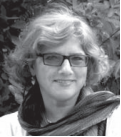Yet, marginal as it was in the context of Russian literary tradition, Jewish literature written in Yiddish, existed and continued to thrive in Russia even after the revolution, in the twenties.
The commissars associated Yiddish with the poor Jewish proletariat and therefore didn’t forbid it. But the vibrant Yiddish culture that included theatres, magazines, newspapers, publishing houses (more than 60) was expunged by Stalin and, after the Holocaust was never to be revived again. So, in the absence of a Jewish language and the diminishing Jewish population in today’s Russia, what are we to latch on to?
According to the Russian-Jewish digital encyclopedia, literature written in Russian can be called JewishRussian if it is rooted in a Jewish civilization, organically connected with it and if it addresses the Jewish themes. Curiously enough, the list of Jewish writers, at least partially fitting that definition, ends in the 90s, as the majority of them moved to Israel after Perestroika. But that is not to say that Jewish life is now nonexistent. On the contrary, the collapse of Communism brought about the revival of Jewish traditions as the ban on religion, learning, and languages (Hebrew and Yiddish) was removed. That period is characterized by the establishment of several important publishing houses. “Gesharim” publishes about 50 books a year, focusing on scholarly editions like Biblioteca Judaica, monographs on religion, philosophy, Zionism and so on. Other houses publish Israeli authors: poetry, fiction and children’s books translated from Hebrew; as well as American-Jewish authors translated from English. The house of Jewish Book in Moscow is in fact the centre of culture and information that runs cultural programs and includes a library, art centre and a book store.
Furthermore the year 2015 saw another important event: the final publication in Russia of the so-called “Black Book”, a compendium of documents and testimonials of the Nazi crimes against Russian and Polish Jews during the Second World War.
Here in the West, the existence of such documents we now take for granted. But in Stalin’s times the Holocaust was officially denied; producing such a book could cost writers their lives. The book was compiled by two courageous and famous Soviet writers of Jewish origin, Ilya Erenburg and Vasily Grossman, the war correspondents who witnessed the Nazi crimes at first hand. Both writers were members of the anti-Fascist committee that Stalin has dispersed in 1948, executing most of its members: miraculously, Erenburg and Grossman have survived to produce, later, their own masterpieces. The “Black Book” figured at the Nuremburg Trials as the major evidence against other members of the anti-fascist committee. Unfortunately 27 volumes of preparatory materials and testimonies were confiscated by KGB. For the first time, the incomplete version of the “Black Book” was published in Russian in 1980 in Jerusalem. That, of course, didn’t make it available to the readers in the Soviet Union, which partly explains why the majority of people in the Communist Russia knew nothing about the Holocaust fifty years after it happened. It was not until the late 90s that writers and researchers were able to access KGB achieves and see all 27 volumes of the “Black Book” for the first time. Three generations later it is finally available in the country of its origin.
Marina Sonkina
msonkina@gmail.com
 Marina Sonkina, Ph.D., author and academic teaches literature and cultural history in Adult Education Programs at UBC and SFU. Her culture tours to Russia enjoy great popularity among her students. More about the author and her recent trip to Russia can be found in:
Marina Sonkina, Ph.D., author and academic teaches literature and cultural history in Adult Education Programs at UBC and SFU. Her culture tours to Russia enjoy great popularity among her students. More about the author and her recent trip to Russia can be found in:
http://bcbooklook.com/2016/10/27/putinspotemkin-village/
Vasily Grossman’s magnum opus is Life and Fate recently reviewed in New Yorker and NRB.
Ilya Ehrenburg’s books include: The Fall of Paris, 2002; The Storm, 2003; and My Paris, 2005.
List of books by Marina Sonkina: Expulsion & Other Stories, 2015.
Short stories: Runic Alphabet, 2009; Tractorina’s Travels and Other Stories, 2008. Lucia’s Eyes and Other Stories, 2011; The Violin That Wanted To See The World, 2011, a children’s book; Comrade Stalin’s Baby Tooth, 2012.





